
Playing politics with the Public Health
The public health system is a political football. Every change of administration is an opportunity to boot the ball at a different set of goalposts. Read more

Bryce is a Senior Fellow at The New Zealand Initiative and the Director of the Wellington-based economic consultancy firm Capital Economics.
Prior to setting up his consultancy in 1997, he was director, and shareholder in First NZ Capital. Before moving into investment banking in 1985, he worked in the New Zealand Treasury, reaching the position of Director.
Bryce holds a PhD in Economics from the University of Canterbury and was a Harkness Fellow at Harvard University. He is a Fellow of the Law and Economics Association of New Zealand.
Phone: +64 4 499 0790

The public health system is a political football. Every change of administration is an opportunity to boot the ball at a different set of goalposts. Read more

Never have governments and central banks spent other people’s money more freely to support incomes and boost banking system liquidity. Never before have the world’s major central banks’ policy interest rates been clustered so close to zero, if not already in negative territory. Read more
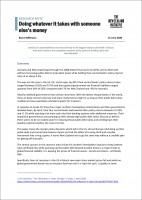
New Zealand is now on a dangerous path to higher public debt and unprecedented money printing with no credible plan for unwinding the situation before the next crisis, warns a new report by The New Zealand Initiative. Covid-19 and the various types of lockdown responses have caused many governments to go even more heavily into debt and print money to sustain asset prices with borrowed money. Read more

For the last couple of decades, public debt and banking system liquidity has been ratcheting up around the world after each recession or market correction. But no one appears to have any credible plan for restoring public debt, liquidity or central bank policy rates to normal levels. Read more
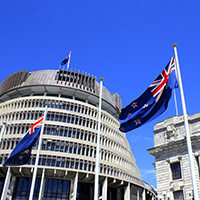
Last Friday, I was invited to appear before Parliament’s Epidemic Response Committee on Tuesday 19 May. The topic was Budget 2020. Read more

As the country looks for ways to recover from the Covid-19 recession, the government is tweaking a few rules to help it along. One of its actions was to amend the Overseas Investment Act, or OIA. Read more
Our Senior Fellow Dr Bryce Wilkinson presented to the Epidemic Response Committee on 19 May 2020. He shared his thoughts on Budget 2020 and the impact of Covid-19 on the economy. Read more
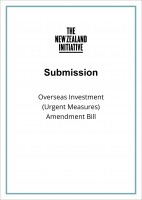
Read our submission, written by Dr Bryce Wilkinson, to the Finance and Expenditure Committee. In summary: On 14 May, the Government introduced an Overseas Investment (Urgent Measures) Amendment Bill to the House and held its first reading on the same day. Read more
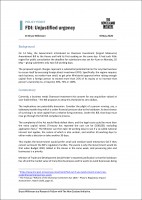
On 14 May, the Government introduced an Overseas Investment (Urgent Measures) Amendment Bill to the House and held its first reading on the same day. It had such little regard for public consultation the deadline for submissions was set for 4 pm on Monday, 18 May – giving submitters only two full working days. Read more
Hardly anyone has questioned the merits of the Government spending taxpayer money in response to Covid-19, or examined its implications for public debt levels and future tax burdens. Next week’s Budget 2020 will reveal those fiscal implications. Read more
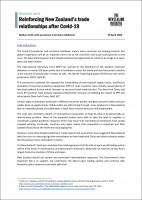
The Covid-19 pandemic and economic lockdown means many countries are looking inwards. But global cooperation will be an important lever out of the economic and social consequences of the virus. Read more

Last Wednesday, The New Zealand Initiative published a 13-page research report explaining why reliance on central bank credit to fund fiscal deficits is not a free lunch and it is economically dangerous to claim otherwise. The New Zealand Social Credit Association subsequently placed a full-page advertisement in the weekend’s Herald espousing the opposite position. Read more

Bryce Wilkinson discusses the findings in his report Quantifying the wellbeing costs of Covid-19 in the Business Daily Programme on BBC World Service. Read more

Senior Fellow Bryce Wilkinson highlights in a new report some concerning ideas from both the government and the Reserve Bank about expanding the money supply to help pull New Zealand out of the Covid-19 economic crisis. He discusses his research and findings on TVNZ Breakfast. Read more
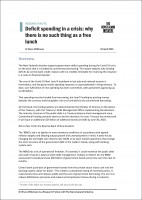
The New Zealand Initiative supports government deficit spending during the Covid-19 crisis on the basis that it is funded by conventional borrowing. This report explains why funding deficits by central bank credit creation with no credible timetable for reversing the situation is a route to financial disaster. Read more